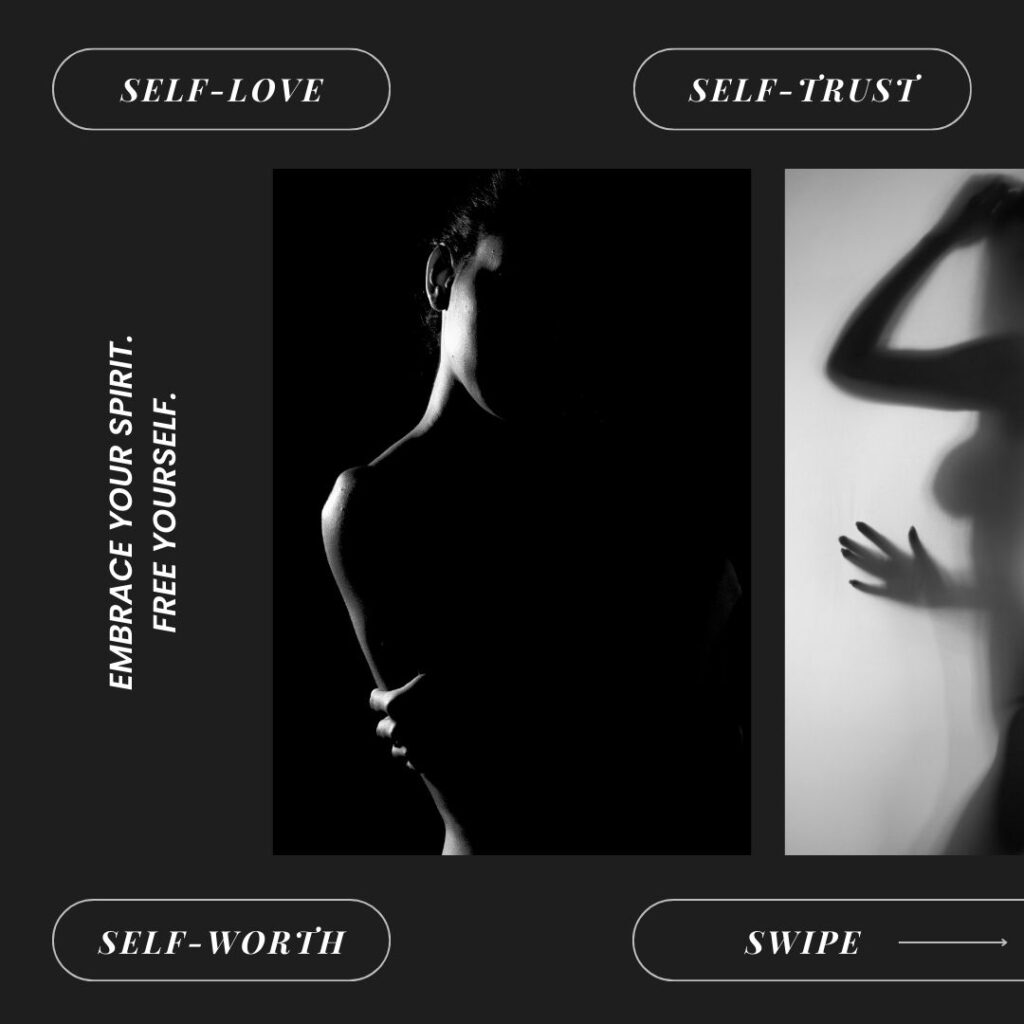Self-worth refers to the value you attribute to yourself as a person, independent of external achievements, possessions, or the opinions of others. It’s a deep-seated sense of being worthy of love, respect, and care, based on an intrinsic understanding of one’s value as a human being. Unlike self-esteem, which can fluctuate based on accomplishments or failures, self-worth is more about an inherent belief in your own value as an individual.
Key Components of Self-Worth Include:
- Intrinsic Value: Recognizing your inherent worth simply because you exist, not because of what you do, what you have achieved, or how others perceive you.
- Unconditional Self-Acceptance: Accepting yourself fully, including your strengths and weaknesses, without conditions attached. It means believing in your worth even in the face of mistakes or shortcomings.
- Self-Respect: Treating yourself with kindness, respect, and compassion, and not compromising your values or well-being to please others or gain external approval.
- Self-Love: Cultivating a positive relationship with yourself that includes caring for your physical, emotional, and mental health, and seeking personal growth and fulfillment.
- Resilience: The ability to bounce back from setbacks, failures, or rejections, knowing that these experiences do not define your worth or diminish your value as a person.
Building and maintaining a healthy sense of self-worth is crucial for overall well-being. It influences your relationships, career choices, and the boundaries you set, and it also affects your resilience in the face of life’s challenges. Cultivating self-worth involves introspection, healing past wounds, challenging negative beliefs about oneself, and engaging in practices that reinforce a positive self-image and self-respect.
Gates Related to Self-Worth
In Human Design, issues related to self-worth can be linked to several gates, especially when they are defined in your chart. These gates, when understood and integrated healthily, can offer paths to overcoming self-worth issues. However, when they are conditioned by external influences or not understood properly, they may contribute to challenges in self-worth. Here are some key gates to consider:
Gate 10: Behavior of the Self
- Location: G Center (Identity Center)
- Theme: Love of oneself, behavior, and actions in the world.
- This gate is directly related to self-love, self-esteem, and how we express our identity. When not operating correctly, it can lead to issues with self-worth, where the individual might struggle with identity and act inconsistently with their true self.
Gate 21: Control
- Location: Heart/Ego Center
- Theme: Control and management of resources, including personal power and willpower.
- This gate can influence issues around control and self-worth, particularly relating to the need to control one’s environment or others to feel worthy or valuable.
Gate 25: The Spirit of the Self
- Location: G Center (Identity Center)
- Theme: Universal love, the spirit of the self, and the drive to find a higher purpose.
- Challenges with this gate might manifest as feeling disconnected from one’s inner spirit or purpose, impacting one’s sense of self-worth and connection to universal love.
Gate 35: Change
- Location: Throat Center
- Theme: Experience and the desire for change.
- This gate’s challenge might be related to how experiences are processed and the search for purpose in those experiences. Difficulty in finding purpose or meaning in experiences can affect self-esteem.
Gate 40: Aloneness
- Location: Heart/Ego Center
- Theme: Aloneness, delivering, and the willpower to support oneself.
- Issues here can relate to feeling alone or unsupported, which might impact an individual’s self-worth, especially regarding their ability to stand independently or feel worthy of support.
Gate 51: Shock
- Location: Heart/Ego Center
- Theme: Awakening through shock, competition, and the need to overcome challenges.
- Challenges with this gate may lead to self-worth issues stemming from one’s response to competition or shock. It’s about the drive to overcome and transform through challenges.
When these gates are defined in a chart, they can indicate areas where an individual has consistent access to the energy of that gate but also where there might be potential for learning and growth in relation to self-worth. Undefined gates can also be areas of learning and growth, where the individual may feel inconsistent or uncertain, leading to potential for conditioning.
Understanding how these gates operate in your chart, particularly how they interact with the rest of your design, can offer insights into overcoming self-worth challenges. Reflecting on these gates’ themes can help you recognize where you may be living out of alignment with your true self, influenced by conditioning, and where you have opportunities to grow in self-love and acceptance.
Deconditioning & Self-Worth
Deconditioning low self-worth in the context of Human Design involves a journey of self-discovery and embracing your true nature. Each Human Design type (Manifestor, Generator, Manifesting Generator, Projector, and Reflector) has its unique strengths and strategies for interacting with the world. Recognizing and living according to your type, authority, profile, and the intricacies of your individual design can significantly impact your self-worth. Here are some general steps to begin deconditioning low self-worth through the lens of Human Design:
Understand Your Design
- Study Your Chart: Deeply understanding your Human Design chart is the first step. Know your type, strategy, authority, profile, centers (defined and undefined), and significant gates and channels. This knowledge provides insight into how you’re designed to operate optimally.
- Embrace Your Type and Strategy: Each type has a strategy that, when followed, can significantly reduce resistance and frustration in life. For example, Generators find satisfaction in responding, while Projectors thrive when they wait for the invitation. Living according to your strategy helps align you with your true self.
Recognize Conditioning
- Identify Sources of Conditioning: Look at your undefined centers as areas where you’re most susceptible to conditioning from others and society. These are not weaknesses but areas where you’re designed to gain wisdom. Understanding this can help shift your perspective from seeing them as sources of insecurity to opportunities for growth.
- Acknowledge Your Strengths: Focusing on your defined centers and channels can help you recognize your innate strengths and gifts. Celebrating these aspects can boost your self-worth.
Practice Self-Acceptance
- Accept Your Unique Path: Human Design teaches that we’re all meant to follow our unique paths. Accepting this can liberate you from the pressure to conform to societal norms or compare yourself to others.
- Honor Your Emotional Cycles: Especially for those with defined emotional solar plexus, recognizing and accepting the natural emotional cycles without judgment can enhance self-acceptance and worth.
Experiment and Observe
- Experiment with Your Strategy and Authority: Practical experimentation with your strategy and listening to your authority (whether it’s emotional, sacral, splenic, etc.) in decision-making can lead to experiences that affirm your worth and capabilities.
- Reflect on Experiences: Reflecting on how following your design affects your life can reinforce the value of living according to your true nature. Keep a journal to track these reflections and growth over time.
Seek Community and Guidance
- Connect with Others: Engaging with the Human Design community, whether through online forums, social media, or local groups, can provide support and insights as you decondition.
- Consider a Guide: A Human Design guide or coach can offer personalized insights and strategies to help you navigate the deconditioning process more effectively.
Deconditioning low self-worth is a process that takes time and self-compassion. It’s about gradually shedding the layers of shoulds and musts imposed by society and embracing the person you were designed to be. As you align more closely with your authentic design, you’ll naturally begin to appreciate your unique value and contribution to the world.






